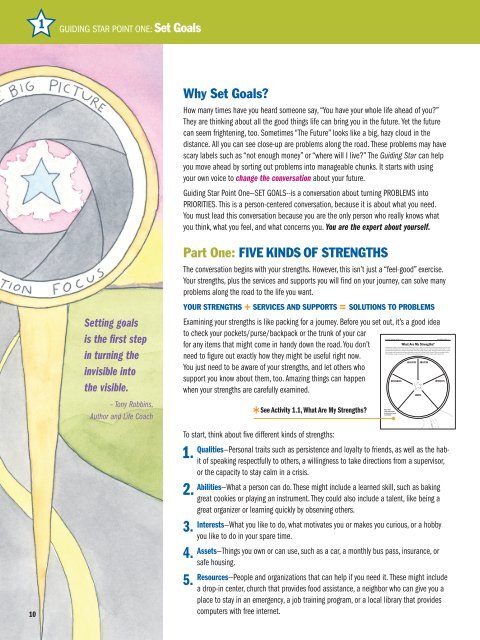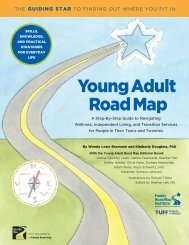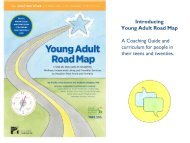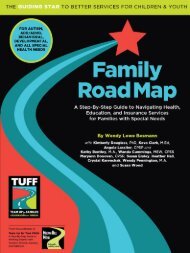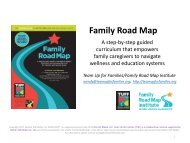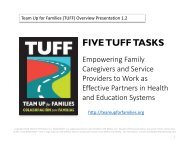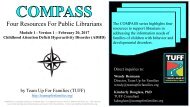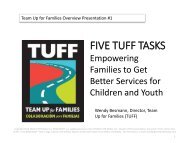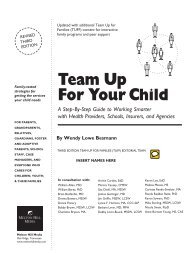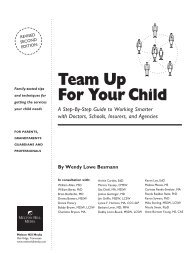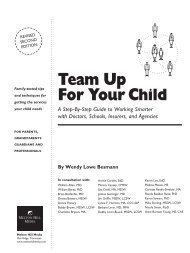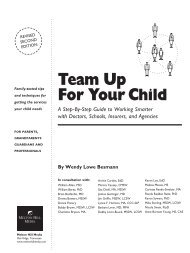Look Inside Young Adult Road Map
Create successful ePaper yourself
Turn your PDF publications into a flip-book with our unique Google optimized e-Paper software.
Guiding Star Point One: Set GOAL Activity 1.1<br />
Other things<br />
people who support<br />
me should know about<br />
my strengths:<br />
<strong>Young</strong> <strong>Adult</strong> <strong>Road</strong> <strong>Map</strong>, page xx<br />
1<br />
Guiding Star Point one: Set Goals<br />
10<br />
Setting goals<br />
is the first step<br />
in turning the<br />
invisible into<br />
the visible.<br />
– Tony Robbins,<br />
Author and Life Coach<br />
Why Set Goals?<br />
How many times have you heard someone say, “You have your whole life ahead of you?”<br />
They are thinking about all the good things life can bring you in the future. Yet the future<br />
can seem frightening, too. Sometimes “The Future” looks like a big, hazy cloud in the<br />
distance. All you can see close-up are problems along the road. These problems may have<br />
scary labels such as “not enough money” or “where will I live?” The Guiding Star can help<br />
you move ahead by sorting out problems into manageable chunks. It starts with using<br />
your own voice to change the conversation about your future.<br />
Guiding Star Point One—SET GOALS--is a conversation about turning PROBLEMS into<br />
PRIORITIES. This is a person-centered conversation, because it is about what you need.<br />
You must lead this conversation because you are the only person who really knows what<br />
you think, what you feel, and what concerns you. You are the expert about yourself.<br />
Part One: Five Kinds of Strengths<br />
The conversation begins with your strengths. However, this isn’t just a “feel-good” exercise.<br />
Your strengths, plus the services and supports you will find on your journey, can solve many<br />
problems along the road to the life you want.<br />
YOUR STRENGTHS + SERVICES AND SUPPORTS = SOLUTIONS TO PROBLEMS<br />
Examining your strengths is like packing for a journey. Before you set out, it’s a good idea<br />
to check your pockets/purse/backpack or the trunk of your car<br />
What Are My Strengths?<br />
for any items that might come in handy down the road. You don’t<br />
need to figure out exactly how they might be useful right now.<br />
Qualities abilities<br />
You just need to be aware of your strengths, and let others who<br />
support you know about them, too. Amazing things can happen<br />
resources<br />
when your strengths are carefully examined.<br />
assets<br />
*<br />
See Activity 1.1, What Are My Strengths?<br />
To start, think about five different kinds of strengths:<br />
Qualities —Personal traits such as persistence and loyalty to friends, as well as the habit<br />
of speaking respectfully to others, a willingness to take directions from a supervisor,<br />
1.<br />
or the capacity to stay calm in a crisis.<br />
2. Abilities—What a person can do. These might include a learned skill, such as baking<br />
great cookies or playing an instrument. They could also include a talent, like being a<br />
great organizer or learning quickly by observing others.<br />
3.<br />
4.<br />
5.<br />
Examining your strengths is like packing for a journey. Before you set out, it’s a good idea to check your pockets/purse/backpack or the trunk of your<br />
car for any items that might come in handy down the road. Amazing things can happen when your strengths are carefully examined. Page XX in your<br />
guide describes five different kinds of strengths. Being persistent is one kind of strength (called a quality). Having good medical insurance is another<br />
kind of strength (called an asset). Having a support group might be another kind of strength (called a resource.) Read more examples of the five<br />
kinds of strengths on page X of your Guide. Then write down a few words that describe each of your strengths, using the spaces below.<br />
Interests—What you like to do, what motivates you or makes you curious, or a hobby<br />
you like to do in your spare time.<br />
Assets—Things you own or can use, such as a car, a monthly bus pass, insurance, or<br />
safe housing.<br />
Resources—People and organizations that can help if you need it. These might include<br />
a drop-in center, church that provides food assistance, a neighbor who can give you a<br />
place to stay in an emergency, a job training program, or a local library that provides<br />
computers with free internet.<br />
interests


